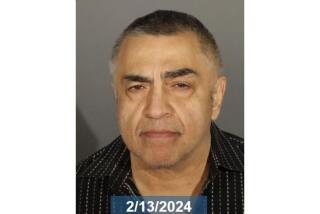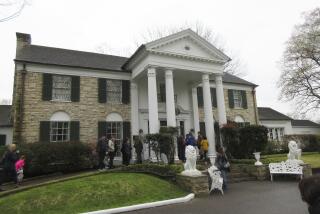Title Company ‘Sting’ Leads to Pair’s Arrest : Suspicion Aroused by Forged Documents in Loan Application
- Share via
A title insurance company may not seem a likely setting for a “sting” operation. But, such is not uncommon today in an industry plagued by a proliferation of forged title documents.
H. Collyer Church, vice president and chief counselor for Glendale-based World Title Co., is part lawyer, part sleuth.
He is a former assistant attorney general for the state of Washington and a specialist in insurance underwriting law.
Successful ‘Sting’ Operation
Last December, Church and others at World Title brought together a mortgage broker, the conservator for the estate of a West Los Angeles widow, her attorney, a banker, a title security guard and bunco and forgery detectives of the Los Angeles Police Department. The successful sting operation, involving World Title personnel and Sgt. Doug Mahoe and his partner, Det. Charlene Reming, led to the arrest in December of two suspects in a forgery-embezzlement scheme, who are out on bail awaiting trial.
Tell-tale signs of fraud in the case surfaced when the title company was asked to insure title to a single-family residence in West Los Angeles.
The request involved a home-equity loan application for $95,000 through a private loan broker. The house was valued at about $150,000.
Records showed that the house had been purchased in 1929 by the previous owners, Harry and Rose Meyers, and that they had executed a community oil and gas lease in 1964.
So far, nothing unusual, Church said. “But our role as a title insurance company is to spot the exception. A title search requires an examination of public records, laws and court decisions to disclose all facts, current and past, concerning ownership.
“A further look through the documents revealed a grant deed from Harry and Rose to the new party, recorded on Nov. 4, 1988. But there was one suspicious detail--a 10-month gap between the date of the deed and the recording date, with taxes on the deed indicating a sale price of $50,000 in January of 1988, well below the market value of comparable Westside properties.”
No Commission Issued
Another inconsistency: The signatures of the owners on the 1964 oil and gas lease did not match those on the 1988 notarized deed, which was apparently uninsured and handled without an escrow, Church said. A check with the California Secretary of State’s office revealed that no notary commission had been issued in the name used for the notary’s signature on the deed.
“After calls to Harry and Rose, answered by a phone machine, and a check of the assessor’s rolls and telephone directory, we learned from neighbors that Rose had been taken to a convalescent home a few months before and that Harry had been deceased for three years,” Church said. “Rose’s nephew-conservator was contacted and a quiet-title action was initiated for a lis pendens notice (a pending suit that would block any transaction on the property).”
The mortgage broker told the loan applicant that he would have to deliver a statement of confirmation from the sellers to World Title, before the money would be paid. A detective posing as a title officer arrested the suspects when the money exchanged hands.
“It was a very satisfying experience for all of us,” Church said. “It saved the widow the expense of clearing her property and saved the loan broker $155,000.”
Title insurance can provide important protection to the homeowner and it is important for the seller or buyer of a property to understand what it does, Church said.
“For one thing, it does not insure against errors, such as boundary lines; it is the responsibility of title officers to check for any discrepancies as to boundary lines. I’ve done work on farmland, for example, where property lines followed rivers and were marked by trees.
“But over the years, the rivers had changed and the trees had been chopped down. Often we have to get statements from neighbors on either side, agreeing to what is assumed to be a rightful boundary,” Church said.
World Title has identified the following as danger signals that the consumer should be alert to:
--A deed, mortgage or deed of trust is usually insured today and if it is not, it should be examined closely.
--To increase the apparent equity in the property, a forger will place on record a forged release of mortgage or reconveyance of deed of trust. A release of this type will usually occur independently of any other real estate transaction.
“We also look carefully at drop-in customers, excessive demand for speed by the customer and a property that is vacant, in which case we require additional verification of the identity of the seller,” Church said.
Fraud can be treated either as a misdemeanor or felony. A misdemeanor conviction can lead to a sentence of not more than one year in county jail; a felony sentence could be a year or more in a state penitentiary.
Church said he plans to submit proposals to strengthen legislation dealing with possession and control of notarial seals.
More to Read
Sign up for Essential California
The most important California stories and recommendations in your inbox every morning.
You may occasionally receive promotional content from the Los Angeles Times.













